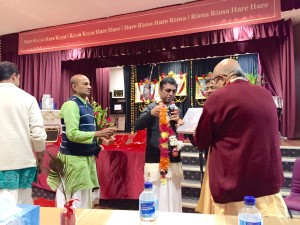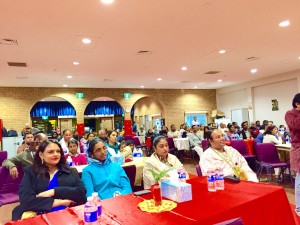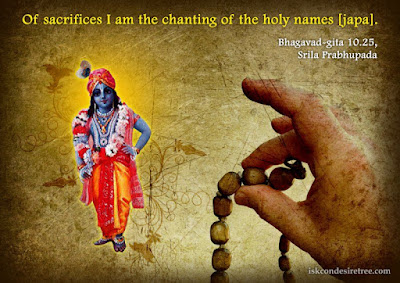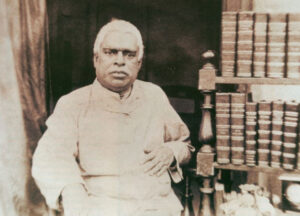 by Assit Administrator 2 SJMKL - Srila Bhakti Vinode Thakur Disappearance Day 2015
by Assit Administrator 2 SJMKL - Srila Bhakti Vinode Thakur Disappearance Day 2015 SJMKL – Srila Bhakti Vinode Thakur Disappearance Day 2015
SJMKL – Panihatti Cida Dahi Festival 2015
→ ISKCON Malaysia Photos
SJMKL – Panihatti Cida Dahi Festival 2015
→ ISKCON Malaysia Photos
SJMKL – Panihatti Cida Dahi Festival 2015
→ ISKCON Malaysia Photos
SJMKL – Panihatti Cida Dahi Festival 2015
→ ISKCON Malaysia Photos
SJMKL – Panihatti Cida Dahi Festival 2015
→ ISKCON Malaysia Photos
SJMKL – Panihatti Cida Dahi Festival 2015
→ ISKCON Malaysia Photos
SJMKL – Panihatti Cida Dahi Festival 2015
→ ISKCON Malaysia Photos
SJMKL – Panihatti Cida Dahi Festival 2015
→ ISKCON Malaysia Photos
SJMKL – Panihatti Cida Dahi Festival 2015
→ ISKCON Malaysia Photos
SJMKL – Panihatti Cida Dahi Festival 2015
→ ISKCON Malaysia Photos
Pensioner with a Big Heart
→ ISKCON Malaysia
BY BCC
SEBERANG JAYA - The recent Sunday Feast, Simheswara Dasa received a cheque for RM10,000 from Cakreswari Dasi as 50% sponsorship of her RM22,000 pledge towards Srila Prabhupada Gallery. She's a pensioner with a big heart to serve Sri Guru & Sri Gauranga!
Every Sunday without fail she would go for book sankirtan. She is also very active in Food For Life in Bhaktivedanta Cultural Center (BCC) & outside (markets, orphanages, etc) too, helps out in the deity kitchen services almost everyday and heaps more of services done by mataji.
Beside her, there are also so many other such jewels who are serving with their pure hearts from this humble place we all call BCC, which will be revealed from time to time.
For your kind information, this gallery is being created in the honour of Srila Prabhupada is first of its kind in South East Asia and East Asia. It will consist of a variety of art styles done by skillful artists. This gallery of Srila Prabhupada will be located at the 2nd floor of Sri Sri Radha Krishna Temple & will be officially opened on the 30th of August 2015. If you would like to assist us to honor this great personality, feel free to contact us. Any kind donation will be of great help.
Thank you all for being a gem!
2015 06 13 Chetana Festival Who’s Responsible-Radharani Mataji ISKCON Chowpatty
→ Gouranga TV - The Hare Krishna video collection
2015 06 13 Chetana Festival Who’s Responsible-Radharani Mataji ISKCON Chowpatty
If Gods will is the universal cause for everything why do some events such as quakes that happen only at specific places?
→ The Spiritual Scientist
Answer Podcast:
Download by “right-click and save content”
When heavenly residents have subtle bodies dont all bodies contain all elements?
→ The Spiritual Scientist
Answer Podcast:
Download by “right-click and save content”
When doctors find treatments nature endows germs with resistance to medicies – why?
→ The Spiritual Scientist
Answer Podcast:
Download by “right-click and save content”
When likings are relative to species whats wrong with a hogs attraction to stool?
→ The Spiritual Scientist
Answer Podcast:
Download by “right-click and save content”
The Meaning of “Rāma” in the Hare Krishna Mahāmantra
→ The Enquirer
The word rama literally means “pleasure.” With a long initial “a,” rāma, it means “pleaser and enjoyer” – a “lover” in the romantic and erotic sense. It is a name for the god of eros, kāma-deva, and is used amongst commoners to denote any extremely seductive and attractive man or woman.
The words rāma and krishna form a natural pair, because krishna indicates the attraction of consciousness, and rāma indicates the thing consciousness is attracted to: pleasure! It also indicates the result of being attracted to krishna: pleasure.
If krishna refers to Brahman – the self-sustaining, effortlessly manifest effortless consciousness – then rāma refers to the bliss of that carefree existence: brahmānanda – nirvāṇa.
If krishna refers to Paramātmā – the effortless manifestor of all consciousness – then rāma refers to śānta-rasa the joyful experience of seeing all things as equally divine and thus feeling effortlessly peaceful and satisfied.
If krishna refers to Bhagavān – the epitome of effortlessly joyful personal consciousness – then rāma refers to devotional sentiment, bhakti-rasa, the feeling of affection and admiration for that Supreme Person.
Some say that the entire mahāmantra is about Bhagavān and the word krishna refers to one manifestation of Bhagavān, the Gopa of Vṛndāvana, but Rāma refers to a different manifestation, either Paraśū-rāma, Rāma-chandra, or Bala-rāma. There is nothing incorrect in this view, but it does not allow the deepest understanding of the mahāmantra to unfold. It is not wrong, but it is not the best understanding either.
The best understanding is that the three nouns of the mantra name and describe the same entity – the being who is the origin of all manifestations of Bhagavān, Paramātmā, and Brahman. That entity is the primeval erotic principle in person – the transcendent, self-manifest kāma-deva at the root of all existence.
By the name krishna he “pulls” and “attracts” us. Then, by the name rāma he enjoys us… and thus delights us.
Tagged: Hare Krishna, Hare Krsna, Mahamantra, Mantra, Rama
Radhika Raman’s Mayapur Seminar on Jiva Goswami’s Sat Sandarbhas
→ Nityananda Chandra Das' Blog, ISKCON Dallas
Lately I have been listening to an amazing and philosophical seminar of His Grace Radhika Raman Prabhu. For those who do not know Radhika Ramana Prabhu is a wonderful Vaishnava scholar who did home school at the Boise temple. He started college at 13, valedictorian at 17 of Boise State and a PhD in theology from Oxford by 22. He is now a very young tenured professor in Utah. Please check out the series!
Q & A about my Chanting Article
→ The Enquirer
I was really inspired to see how much interest there was in my article on chanting. There were a few consistent or excellent questions I heard amongst the responses, so I’ll try to reply to them.
About the Speed
I was surprised that a few people found it hard to believe that it is possible to chant rounds quickly (aiming for 3.5 minutes, but at least achieving 4.5 ~ 5 minutes per round). Just get a stopwatch, sit down and time yourself over a period of a few consecutive days, trying to improve your speed. After a few days you’ll figure out how to at least be around 5 ~ 5.5 minutes per round. Remember, the chanting must be light if you are doing it vocally.
About Moving Around
Many people found it hard to believe that moving around rhythmically while chanting is counter-productive. To reiterate, the problem is that this will give us the illusion that we are chanting, when actually we are not paying any attention. The movements count off our progress, because its easy to keep track of movements while thinking of something else. The words of the mantra should count off our progress through the mantras, but it is very difficult or impossible to keep track of those words while thinking about something else – and that’s why we bop around while chanting.
100% of the time, when I realize I’m not paying attention, I also realize that I’m swaying to and fro to keep the beat while my mind drifts off to some other pasture.
The definition of how we should perform japa is āsana – which means “sitting.” And the definition of how āsana should be done is sukha-sthira — comfortable but solid. Solid does not mean bopping around. No śāstra has ever recorded a yogi rapt in concentration while swaying to a beat. They always sit perfectly still.
About Chanting Not Being a Mental Gymnastic
One person asked a very intelligent question. It was something like this, “You said that mental chanting is the most powerful, but you also said that chanting is not something done by the mind. Isn’t this a contradiction?”
Even when chanting is done with the tongue, it is not actually the tongue that produces the mantra. Śrī Rūpa Goswāmī cites Padma Purāṇa as saying ataḥ śrī kṛṣṇa-nāmādi na bhaved grāhyam indriyaiḥ | sevonmukhe hi jihvādau svayam eva sphurty adaḥ – “Śrī Krishna’s name and so on are beyond the reach of the senses, but if the tongue and so on develop a devotional attitude Krishna will appear there of his own accord.”
The mind is the collection of internal senses (the actual sensory powers which receive input through the nervous system from the physical sense organs), so it operates on the same principle. Krishna (his name and so on) is beyond the grasp of the mind. His name cannot be produced by the mind or its sensory tools – but if one takes a devotional attitude, Krishna is delighted to manifest within the grasp of our mind and senses.
To clarify a little bit, while chanting, I have noticed that my mind is only straining and busy when I am trying to wrestle with other simultaneous thoughts. If I simply agree, “OK, no other thoughts right now, I am giving my attention wholly to Krishna – let him take it or leave it as he pleases and do what he wants with it.” Then, chanting becomes easy and delightful.
I hope these replies are useful to the great devotees who are sincere about developing a relationship with Krishna name. I hope I am of service to them by posting these articles.
Vraja Kishor das
Tagged: Chanting, Hare Krishna, Japa, Mahamantra, mantra-japa
Sydney Fund Raising Dinner
→ Ramai Swami
The Sydney devotee community is looking forward to building another temple at Vineyard in the western part of the city. They have named it Sri Sri Radha Govinda Mandir.
Why I Started The Japa Group
→ Japa Group
It also came from a strong desire to share my thoughts about this important activity....my struggles and small realisations and to broadcast the writings and words of other devotees.
The group has come along way since then, almost 5,000 members on Facebook and many email subscribers plus numerous encouraging letters from members in various countries.
Thank you everyone for your support - please continue to share and spread the word on Japa!
Not a lazy lion!
→ KKSBlog
(Kadamba Kanana Swami, 26 April 2015, Radhadesh, Belgium, Vyasa Puja Morning Lecture, Caitanya Caritamrta Madhya Lila 24.124)
 I would like to speak about the theme of collecting blessings because that is the reason why we are here. When it comes to spiritual strength, on our own we don’t really have any. The exception might be for some very advanced devotees but for most of us, we are not having that much strength. So, seeking blessings and seeking shelter is the only thing we can do and we should do it constantly. Therefore, a lot of hearing, a lot of chanting and a lot of service is what is required. See, when spiritual life becomes a routine, still it is undoubtedly very powerful, as it is a transcendental routine so whatever little thing we do is quite powerful. However, ‘This will do,’ is not a good mentality. The mentality should be to think, ‘It may be not enough!’ And what if it IS not enough!? What if is not enough to attract Krsna’s mercy? Mercy of Krsna cannot be taken for granted therefore one should not start thinking, ‘Well, I think I am doing reasonably well. I think by common standards, one can say that I am doing reasonably well. So, I think I can be satisfied.’
I would like to speak about the theme of collecting blessings because that is the reason why we are here. When it comes to spiritual strength, on our own we don’t really have any. The exception might be for some very advanced devotees but for most of us, we are not having that much strength. So, seeking blessings and seeking shelter is the only thing we can do and we should do it constantly. Therefore, a lot of hearing, a lot of chanting and a lot of service is what is required. See, when spiritual life becomes a routine, still it is undoubtedly very powerful, as it is a transcendental routine so whatever little thing we do is quite powerful. However, ‘This will do,’ is not a good mentality. The mentality should be to think, ‘It may be not enough!’ And what if it IS not enough!? What if is not enough to attract Krsna’s mercy? Mercy of Krsna cannot be taken for granted therefore one should not start thinking, ‘Well, I think I am doing reasonably well. I think by common standards, one can say that I am doing reasonably well. So, I think I can be satisfied.’
 I can agree with those words to an extent but still, I myself cannot ever think like that – it is not possible. I am kind of afraid to think like that because I might be satisfied, but is Krsna going to be satisfied? And if He is not going to be satisfied then what will happen in the end, what will the result be? So I better go the extra mile then!
I can agree with those words to an extent but still, I myself cannot ever think like that – it is not possible. I am kind of afraid to think like that because I might be satisfied, but is Krsna going to be satisfied? And if He is not going to be satisfied then what will happen in the end, what will the result be? So I better go the extra mile then!
To balance this, I have to say that it is not a statement which is meant to drive people into over-endeavor where we begin to push ourselves in spiritual life where we harm our sadhana, our health and actually, we harm Krsna’s interest. It is in Krsna’s interest that we maintain our body in a good condition so that it remains a suitable tool. There is really no heroism in taking bath in ice water when twenty years later one is bent over with arthritis and seriously slowing down in service. I know about these things! Over-endeavor is not what I am advocating when I am speaking about going the extra mile. But when I speak about the extra mile, it is also not fanaticism, when one might say about me, ‘Well, it’s his nature!’ Now, that might be true to an extent. You know, in Vedic astrology, I have a Leo rising and lions are not pussycats, so what to do about that! (laughter) And also in Vedic astrology, upon the planets there are stars called naksatras which are at a greater distance and these stars give a particular influence – so in my case, there is a naksatra that makes me the lion on the chase. So I am not your lazy lion! I try sometimes but I cannot be one! (laughter) I wish I could sometimes. I had my moments when I thought, ‘I wish I could just do nothing!’ But there is no such thing. However, to such wishes there is not a great benefit because the real benefit is there in the service.
Two verses characterizing the Gita and Kurukshetra battle
→ Servant of the Servant
Sanjaya in the last and final verse of the Gita does the opposite. He answers Dhritrashtra's question unequivocally by saying that your sons' will not win because wherever there is Krishna with His pure devotee Arjuna, there is surely to be victory, opulence and moral justice. I think Sanjaya's final answer put to rest in a poetic yet definitive manner any optimism on the part of Dhritrishra had towards his sons.
As an outsider, simply studying these two verses symbolize the characters involved in the Gita and sets the stage and outcome of the Kurukshetra battle respectively.
Hare Krishna
Die Before Dying—Move Before Moving: Parts 1 & 2
→ Karnamrita's blog
(this blog is recorded on the full blog page: quick time player is needed; works best with Firefox or Explorer; if you are using Google Chrome it will automatically play, so if you don't want to listen, mute your speakers.)

Part 1[Republished from June 16th, 2015]
Devotee: “Hey! Haribol! How are you? I noticed that you haven’t written any new blogs on Krishna.com in quite a while. What have you been up to?”
Karnamrita: “I am good, thanks. Krishna is very kind! For the last two months I have taken a full time job, so I have been recycling, or reposting, my older blogs, which don’t usually don’t get read.”
D: Really, I thought you were retired?”
K: “I wouldn’t consider myself “retired” or tired, but it’s true that I haven’t worked a regular job in many years. My focus has been on my spiritual practices and writing. However, my new “job” over the last two months has been preparing our house for selling. In other words I have been repairing, painting, cleaning, getting rid of stuff, organizing or straightening what we have kept, making our house spiritually neutral, and doing a great deal of landscaping and gardening. While the lion’s share of the work is done thanks to my hiring a devotee neighbor, there are still many small actions that I continue to complete on a daily basis.”
D: “Organizing and getting rid of things. Hmmmm…that is really difficult for me. What was that like for you?”
Hare Krishna! London Flooded with Devotion Rathayatra – Festival…
→ Dandavats.com

Hare Krishna! London Flooded with Devotion Rathayatra – Festival of Chariots
The Daily Telegraph newspaper, one of the top papers in London, covered the event the day after; putting a ½ page photo of the famous dressed up sister couple of Radha-Krishna for its audience of more than 500,000 people. The MP of Hendon Matthew Offord was in attendance, arriving back from Paris just before, but making it in time for viewing Lords on Their cart at Trafalgar Square.
Read the entire article here: http://www.dandavats.com/?p=17923
Front Page of Bhaktivinoda Thakura’s handwritten…
→ Dandavats.com

Front Page of Bhaktivinoda Thakura’s handwritten Autobiography “Swalikhita Jivani” from BRC’s Birnagar Collection
ISKCON-Delhi: Srila Bhaktivinoda Thakur Disappearance,…
→ Dandavats.com

ISKCON-Delhi: Srila Bhaktivinoda Thakur Disappearance, 16-06-2015 (Album with photos)
See them here: https://goo.gl/67thIZ
Harinama in Moscow (Album with photos)
Srila Prabhupada: In this…
→ Dandavats.com

Harinama in Moscow (Album with photos)
Srila Prabhupada: In this age human beings only live for sixty or eighty years, and even this small life-span is gradually decreasing. Therefore it is even more imperative for human beings to take to the worship of the lotus feet of the Lord by constantly chanting the Hare Krishna mantra, as recommended by Lord Caitanya Mahaprabhu. (Srimad-Bhagavatam, 4.24.67 Purport)
See them here: https://goo.gl/FIuV5L
Hare Krishna! When just being disgusted is not…
→ Dandavats.com

Hare Krishna! When just being disgusted is not enough…
“Jnana-yoga is recommended for those who are disgusted with material life. Those who are not disgusted with material life, having many desires yet to fulfil, should seek perfection through the path of karma-yoga.” “If somehow or other by good fortune one develops faith in hearing and chanting My glories, such a person, being neither very disgusted with nor attached to material life, should achieve perfection through the path of loving devotion to Me.”
Read the entire article here: http://www.dandavats.com/?p=17920
Wasting my rare human birth.
→ Krishna Dharma
DURLABHA MANAVA JANMA
by
BHAKTIVINODA THAKUR
1.
durlabha manava-janma labhiya samsare
krsna na bhajinu — duhkha kahibo kahare?
Born in this rare human body, I did not worship you.
Now Lord I am left lamenting. Who shall I tell this to?
2.
‘samsar’ ‘samsar’, ko’re miche gelo kal
labha na koilo kichu, ghatilo janjal
My time passed in wordly pursuits, without the slightest gain.
My one and only profit was pure anguish and pain.
3.
kiser samsar ei chayabaji pray
ihate mamata kori’ brtha dina jay
This world has no more meaning than a magical display.
Caught up in it with no purpose, my life passes away.
4.
e deho patana ho’le ki ro’be amar?
keho sukha nahi dibe putra-paribar
When at last I drop down dead, what will I then possess?
How then will friends and family afford me happiness?
5.
gardhaber mata ami kori parisram
ka’r lagi’ eto kori, na ghucilo bhram
Why do I work just like an ass each and every day?
Despite my hard endeavour still in darkness I do stay.
6.
dina jay micha kaje, nisa nidra-base
nahi bhavi — marana nikate ache bo’se
Wasting my days in useless work, losing my nights in sleep.
Never seeing that by my side, death does his vigil keep.
7.
bhalo manda khai, heri, pari, cinta-hina
nahi bhavi, e deho chadibo kon dina
Dressing myself so carefully, eating just as I choose.
Living carefree I cannot see that soon this body I’ll lose.
8.
deho-geho-kalatradi-cinta abirata
jagiche hrdoye mor buddhi kori’ hata
In truth I am always anxious, to maintain me and mine.
Ever perplexed by pressing woes, crushing my heart and mind.
9.
hay, hay! nahi bhavi — anitya e saba
jivana bigate kotha rohibe baibhava?
Alas, alas, for my poor plight; unheeding of my death.
What in this world will still be mine after my final breath?
10.
smasane sarir mama podiya rohibe
bihanga-patanga tay bihar koribe
Then this body will lie quite still in the cremation ground
Jackals and crows, ants and worms, will soon gather around.
11.
kukkur srgal sab anandita ho’ye
mahotsava koribe amar deho lo’ye
They will then be in ecstasy, enjoying a great feast.
This body will be a festival, for every bug and beast.
12.
je deher ei gati, ta’r anugata
samsar-baibhava ar bandhu-jana jata
Thus ends my beloved body, with house and family.
And all that I proudly possess, will all but dust soon be.
13.
ataeva maya-moha chadi’ buddhiman
nitya-tattva krsna-bhakti korun sandhan
Be wise then and abandon now, your worldly illusion
Seek out at once the only truth; Krishna’s pure devotion.
Saraswati D’Achille asks an oft asked question, which I will answer here for the last time
→ SivaramaSwami.com
The post Saraswati D’Achille asks an oft asked question, which I will answer here for the last time appeared first on SivaramaSwami.com.
Hare Krishna! The Life of Srila Bhaktivinoda Thakur
He was…
→ Dandavats.com

Hare Krishna! The Life of Srila Bhaktivinoda Thakur
He was always charitable to brahmanas and equally befriended other castes. He never showed pride, and his amiable disposition was a characteristic feature of his life. He never accepted gifts from anyone; he even declined all honors and titles offered by the government to him on the grounds that they might stand against his holy mission of life. He was very strict in moral principles, and avoided the luxurious life; he would not even chew betel. He disliked theaters because they were frequented by “public women.” He spoke Bengali, Sanskrit, English, Latin, Urdu, Persian, and Oriya. He started writing books at age 12, and continued turning out a profuse number of volumes up until his departure from this world.
Read the entire article here: http://www.dandavats.com/?p=17917
The great legacy of Bhaktivinode Thakur
→ The Vaishnava Voice
Bhaktivinode Thakur left us all a great legacy of devotional songs and poetry. Today being the day he passed away in 1914, it is an opportunity for those of us whose lives have been enriched by his words, to take a few minutes and read one or two, or sing them as well.
This morning I sat with my daughter and we sang the song beginning Atmanivedana… from the Saranagati collection. Each song in that book is a nuance of devotional theology; the songs progressing from one aspect to another so that every thought and theological conclusion involved in surrender to God has been expressed. It is a wonderful library of hymns.
The Thakur was writing at a time when much of his thought was regarded as antiquated and merely a remnant of India’s long and beleaguered history. The intellectuals of the day, the English-educated bhadralok, were mostly involved in appeasing their British overlords in order to secure the best paying jobs. The theological aim of the day was to form a Hindu-Christian syncretism so that Hinduism would not be seen as backward.
Bhaktivinode Thakur was fixed in his understanding of the perennial value of devotional bhakti, and taught that it was not something subject to the vagaries of the age. In defiance of many of his contemporaries he wrote his songs and published them.
Thirty-three years after his death the British left India for good and perceptions of India’s philosophical history began to change. In 2015 India is enjoying a resurgence in many ways. People are more proud of India and its traditions, and the Thakur’s songs are being sung by his modern followers all over the country.
Initiations ceremony in Ukraine (5 min video)
Indradyumna Swami:…
→ Dandavats.com

Initiations ceremony in Ukraine (5 min video)
Indradyumna Swami: During the Gauranga Festival this weekend in Ukraine a number of devotees took initiation. The ceremony outside was briefly interrupted by a downpour of rain, which we all took as flowers thrown from the demigods above!
Watch it here: https://goo.gl/G7TM5c
Kirtan London Pop-Up Temple @ London Wellbeing Festival 2015…
→ Dandavats.com

Kirtan London Pop-Up Temple @ London Wellbeing Festival 2015 (Album with photos)
Over four days we welcomed hundreds of people into our Pop-Up Temple space - 10am-7pm. We conducted a mantra meditation workshop and lively kirtan every half hour and introduced people to the temple experience by giving them an opportunity to ‘Offer a flower at the altar and make a wish’, sing, meditate, play instruments, hear some yoga philosophy and ask questions, and leave by receiving a delicious sweet.
See them here: https://goo.gl/QuUy5U
Puroshottam month Bhagavad Gita challenge
“…1 PURUSOTTAMA MASA…
→ Dandavats.com

Puroshottam month Bhagavad Gita challenge
“…1 PURUSOTTAMA MASA VRATTA = 1000 KARTIKA VRATTAS… so an intelligent man who practices devotional service towards the Supreme Lord in this Purushottama month will enjoy a blissful life while in this world and after leaving his body he will return back to Godhead.” – (Lord Sri Krishna in Padma-Purana) ‘Purushottam 2015 – CHAD challenge’ aims to inspire every intelligent human being to read Bhagavad-Gita Chapter 15 every day during the all-auspicious Purushottam month from 17 Jun 2015 to 16 Jul 2015.
Read the entire article here: http://www.dandavats.com/?p=17912
Daily Darshan – June 16th, 2015
→ Mayapur.com
The post Daily Darshan – June 16th, 2015 appeared first on Mayapur.com.
Srimad Bhagavatam Class 07 01 23 By HG Mukunda Madhava Prabhu at ISKCON Juhu on 26 April 2015
→ Gouranga TV - The Hare Krishna video collection
Srimad Bhagavatam Class 07 01 23 By HG Mukunda Madhava Prabhu at ISKCON Juhu on 26 April 2015
How do we differentiate between the mind and the intelligence when the mind can also speak good things?
→ The Spiritual Scientist
Answer Podcast:
Download by “right-click and save content”



















